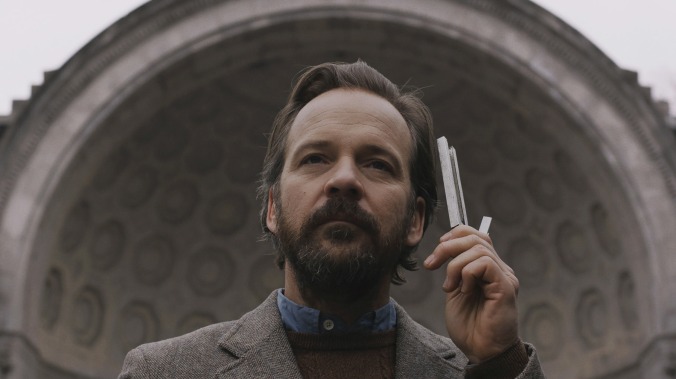Even with echoes of The Conversation, the offbeat indie The Sound Of Silence is too muted

Just about anyone who’s lived in New York City knows that peace and quiet is a rare, precious commodity. The Sound Of Silence, however, takes place in a fantasy Gotham where so little din prevails that numerous residents hire a “house tuner”: someone who claims to identify and remove maddening, barely audible frequencies that may be causing anxiety or depression. Peter Lucian (Peter Sarsgaard) plies this offbeat trade, listening intently to customers’ appliances in search of bad harmonics; a city map on the wall of his study is festooned with pushpins, signifying consistent chords that he’s discovered in various locales. Eventually, however, one of Peter’s clients, a perpetually exhausted woman named Ellen (Rashida Jones), reports that his suggested solution—she should replace her toaster—failed to solve the problem. This sparks an exceedingly minor personal crisis for Peter, exacerbated by the machinations of an assistant (Tony Revolori) with ambitious designs on his research.
Often wearing enormous headphones and seemingly closed off to everything but his work, Peter Lucian recalls Gene Hackman’s surveillance expert in The Conversation, a connection that production designer Nora Mendis and set decorator Ashley Chipman strengthen at one point via a similar-looking loft space. The stakes are considerably lower here, however. Like so many first features these days, The Sound Of Silence originated as a short—titled “Palimpsest,” it ran just 18 minutes—and feels very much like a small, quirky idea that’s now been stretched almost to its breaking point. Both versions are directed by Michael Tyburski, who cowrote each with Ben Nabors, and they do little more than suggest that a rigid theoretical construct like Peter’s isn’t any more mentally healthy than Ellen’s uneasy aversion to change. The film’s premise may be offbeat, but its emotional dynamic could hardly be more predictable, even if any romance between Peter and Ellen (who are both single and lonely) remains implicit and hypothetical.
There’s no much going on here, either thematically or narratively; even Ellen’s apparent best friends (Alex Karpovsky and Tracee Chimo) show up exactly once to provide necessary exposition, with one of them reading aloud from a New Yorker article about Peter. So keeping things lively becomes the cast’s responsibility. Sarsgaard opts for the path of least resistance, making Peter the sort of obsessive loner for whom small talk seems all but impossible; it’s a precise performance, but easily digested at a glance. That doesn’t give Jones much to work opposite, and Ellen’s insistence that Peter isn’t really creepy, even as her description of everything he says and does sounds plenty creepy (to say nothing of what we actually see), lacks conviction. Ace character actors like Austin Pendleton and Bruce Altman show up briefly to embody stereotypes (kindly mentor and callous business exec, respectively), and The Sound Of Silence only really threatens to break out of its schematic shell once, when Peter introduces himself to the editor of a key academic journal and gets treated as if his big paper on New York City soundscapes is the aural equivalent of QAnon. This development suggests an exciting new direction for the film. But by then, it’s all but over.